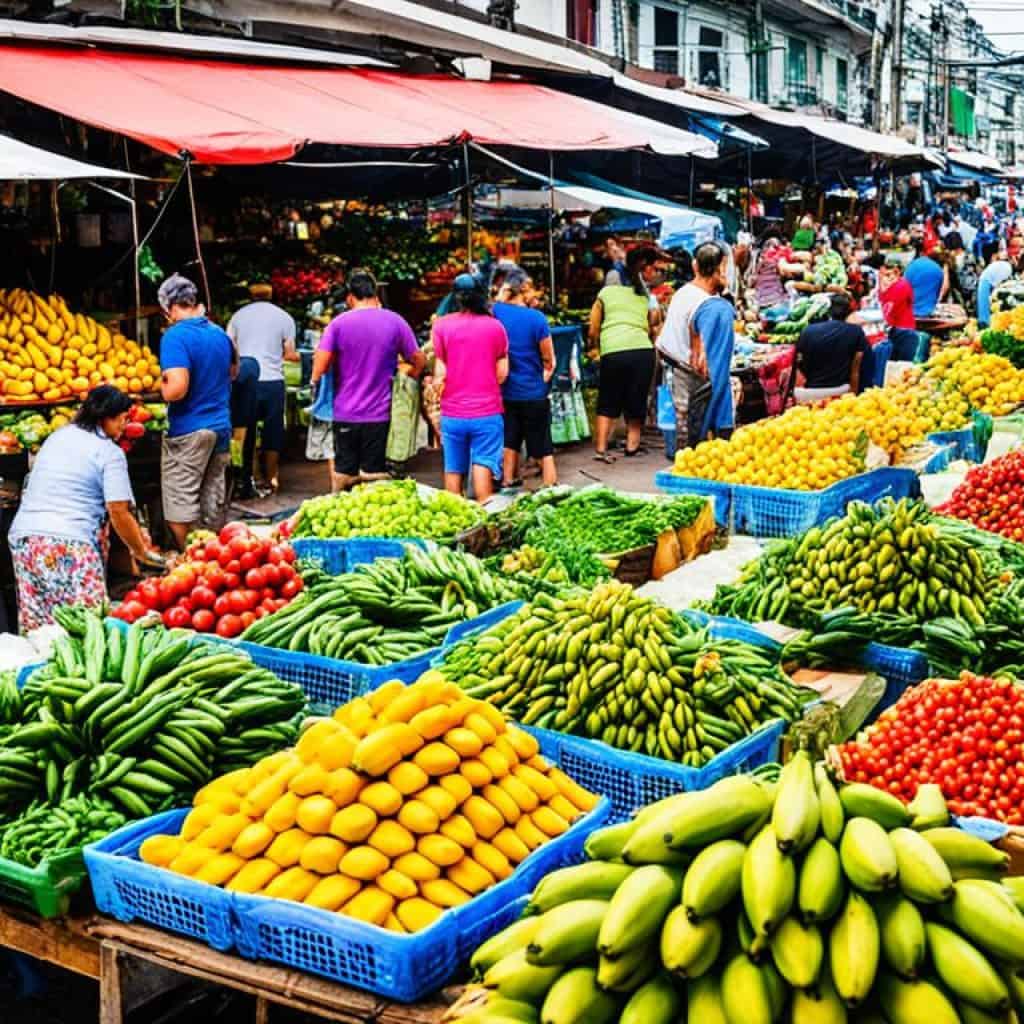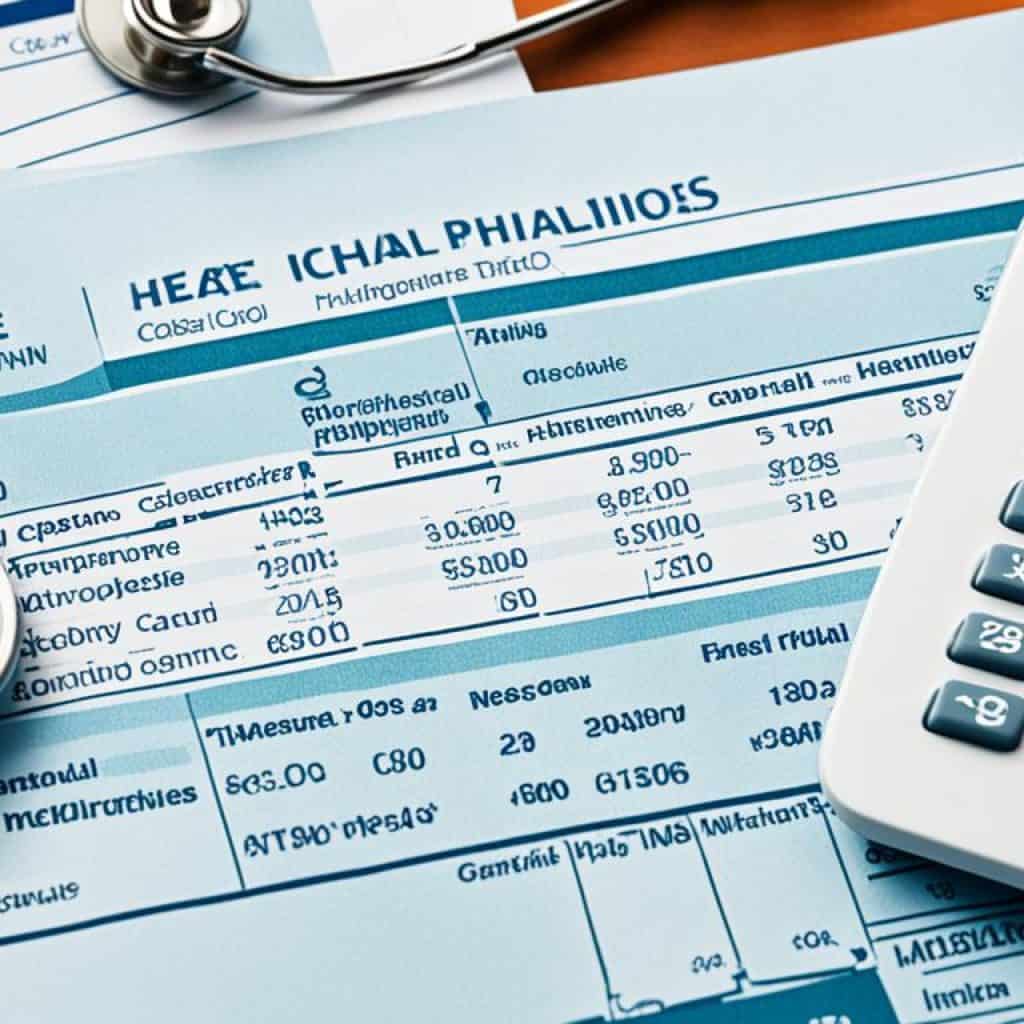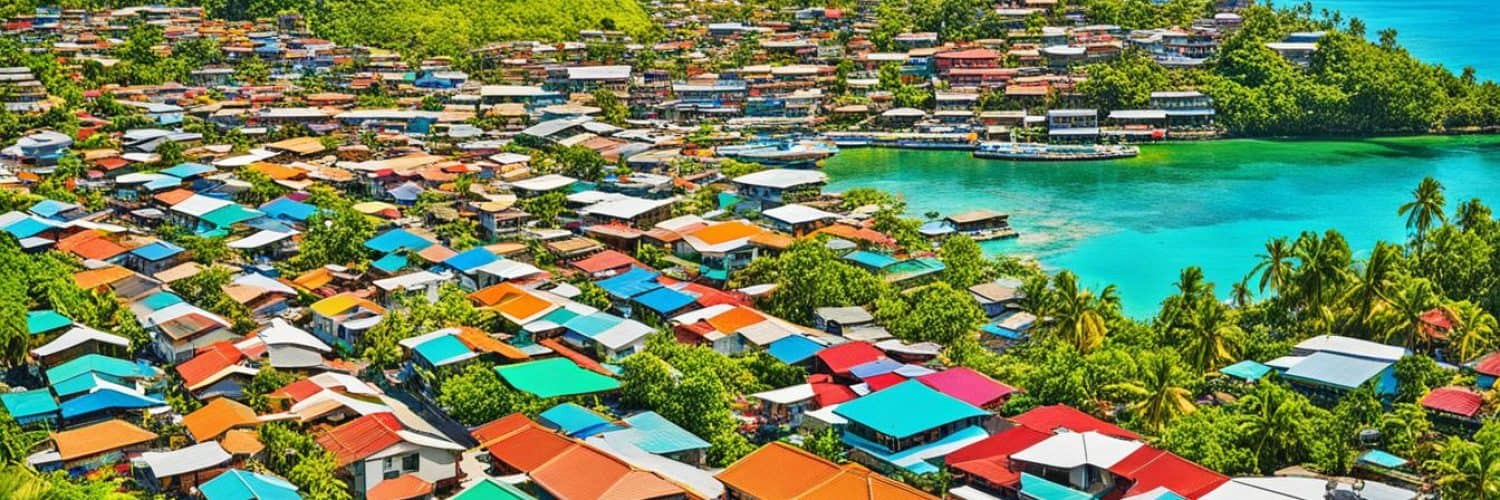Does living in the Philippines as an expat mean saying goodbye to high living expenses and hello to a more affordable lifestyle?
When it comes to the cost of living, the Philippines offers an attractive proposition for expats seeking a change of pace and a lower cost of living. But just how affordable is it? Is it really possible to live comfortably on a moderate budget without sacrificing quality of life?
Key Takeaways:
- The cost of living in the Philippines is significantly lower than in Western countries, offering expats the opportunity to enjoy a comfortable lifestyle at a fraction of the cost.
- Factors such as location and lifestyle choices can influence the overall cost of living in the Philippines, with Manila being more expensive than smaller cities outside of Metro Manila.
- Housing costs in the Philippines vary depending on the location and type of accommodation, with major cities like Manila offering a wide range of options.
- The cost of food in the Philippines is relatively low, especially if you opt for local cuisine or street food.
- The Philippines has affordable transportation options, including public buses, jeepneys, and taxis.
Average Cost Of Living In The Philippines In USD
The average cost of living in the Philippines can vary depending on the city and lifestyle choices. For expats looking to live comfortably, the top places to reside in the Philippines typically range from $1,000 to $1,500 per month. This budget includes all essential expenses such as housing, food, transportation, utilities, and entertainment.
Expat life in the Philippines offers a unique opportunity to enjoy a high quality of life at a fraction of the cost compared to Western countries. The affordable cost of living allows expats to stretch their budget and experience a fulfilling lifestyle amidst the tropical beauty of the Philippines.
When planning your budget, it’s important to consider the specific costs associated with living in the Philippines. This includes housing expenses, which can vary depending on the location and type of accommodation. Whether you prefer an apartment in the bustling city of Manila or a more serene setting in a smaller town, there are options to suit different budgets.
Food costs in the Philippines are relatively low, especially if you indulge in delicious local cuisine. From street food vendors offering affordable and tasty snacks to mid-range restaurants serving mouthwatering dishes, you’ll find a range of options to satisfy your cravings without breaking the bank.
Transportation expenses in the Philippines can also be budget-friendly. Public buses and jeepneys are an economical choice for getting around, while taxis and ride-hailing services offer convenience at a slightly higher cost. It’s essential to factor transportation costs into your budget, especially if you plan on exploring different parts of the country.
Entertainment in the Philippines can be enjoyed without spending a fortune. Whether you’re soaking up the sun on pristine beaches, hiking through lush mountains, or immersing yourself in vibrant local festivals, there are numerous free or low-cost activities to keep you entertained and captivated by the country’s rich culture.
To get a better understanding of the average cost of living in the Philippines, refer to the table below:
| Expense Category | Average Monthly Cost (in USD) |
|---|---|
| Housing | $500 – $1,500 |
| Food | $150 – $300 |
| Transportation | $50 – $100 |
| Utilities | $75 – $150 |
| Entertainment | $100 – $200 |
These figures are approximate estimates, and the actual cost may vary depending on individual preferences and location.
In conclusion, the average cost of living in the Philippines for expats is significantly lower compared to Western countries. With proper budgeting and a little financial planning, expats can enjoy a comfortable lifestyle and make the most of their time in this tropical paradise without straining their wallets.
Housing Costs In The Philippines
When it comes to housing costs in the Philippines, the expenses can vary based on the location and type of accommodation. In major cities like Manila, a one-bedroom apartment can range from $500 to $1,500 per month. However, for those looking for more affordable options, smaller towns and mid-sized cities offer rentals starting at around $200 per month.
Living expenses in the Philippines can be significantly lower compared to Western countries, making it an attractive destination for expats seeking affordable housing options. Whether you prefer the hustle and bustle of a big city or the tranquility of a smaller town, there are housing options available to suit different budgets and preferences.
Expats looking for a lively urban lifestyle with easy access to amenities and entertainment may opt for apartments in major cities like Manila, where the rental costs are higher. On the other hand, those seeking a quieter and more laid-back atmosphere may find affordable options in smaller towns and mid-sized cities.
It’s important to note that the cost of housing is just one factor to consider when planning your expat budget in the Philippines. Other living expenses such as food, transportation, healthcare, and entertainment should also be taken into account to get a comprehensive understanding of the overall cost of living.
Average Monthly Housing Costs in the Philippines
Living in the Philippines: Affordable Housing Options
For expats on a budget, there are plenty of affordable housing options in the Philippines. Whether you prefer apartments, houses, or condominiums, you can find something that fits your needs without breaking the bank.
One option is to explore apartments or condominiums in smaller towns and mid-sized cities. These areas offer lower rental rates while still providing access to basic amenities and services. It’s advisable to research local real estate websites and work with reliable agents to find suitable accommodation within your budget.
If you’re open to sharing living spaces, co-living arrangements can be a cost-effective option. Co-living spaces provide private rooms within a larger shared apartment or house. Not only do they offer affordable rental rates, but they also provide an opportunity to connect with like-minded individuals and build a community.
Another alternative is to consider renting or buying property in less-explored areas of the Philippines. Regions outside of major cities often have lower housing costs and offer a chance to experience a more authentic and less touristy side of the country.
Overall, the key to finding affordable housing in the Philippines is to conduct thorough research, explore different options, and consider your personal preferences and budget. With careful planning and the right resources, you can find a comfortable and affordable home in this beautiful archipelago.
Food Costs In The Philippines
When it comes to the cost of food, the Philippines offers expats an affordable culinary experience. One of the advantages of living in the country is the relatively low cost of local cuisine. You can enjoy delicious meals at budget-friendly prices, allowing you to savor the flavors without breaking the bank.
For those who prefer dining out, a meal at a mid-range restaurant in the Philippines typically costs between $5 to $10. This price range ensures that you can indulge in a variety of dishes without worrying about the expense. Whether you’re craving traditional Filipino dishes or international cuisine, you’ll find a wide selection of restaurants to suit your taste.
If you’re looking for even more affordable options, exploring street food stalls is a must. Street food in the Philippines is not only delicious but also incredibly affordable, with prices as low as $1 per meal. You can savor popular street food delicacies like isaw (grilled chicken intestines), fish balls, and halo-halo (a refreshing dessert with crushed ice, sweet beans, and fruits).
For those who prefer home-cooked meals, grocery shopping in the Philippines is also a wallet-friendly experience. Basic food items such as rice, vegetables, and meat can be found at reasonable prices, allowing you to prepare nutritious meals at home without straining your budget. Whether you choose to cook traditional Filipino dishes or international cuisine, you’ll find it easy to stock up on quality ingredients without spending a fortune.

Overall, the cost of food in the Philippines is relatively low, making it an attractive destination for expats looking to enjoy delicious meals without breaking the bank. Whether you choose to dine out or cook at home, you’ll be pleasantly surprised by the affordability and variety of culinary options available.
Entertainment Costs In The Philippines
Living in the Philippines offers a wealth of affordable entertainment options, making it easy to enjoy your time in this tropical paradise without breaking the bank. Whether you’re a movie lover, a social butterfly, or an adventurer seeking outdoor activities, there’s something for every expat to indulge in.
Movies and Nightlife
If you’re in the mood for a movie night, you’ll be pleasantly surprised by the affordable ticket prices in the Philippines. A trip to the local cinema can cost between $3 to $5, allowing you to catch the latest blockbuster without splurging. Grab your popcorn and enjoy the immersive cinematic experience at a fraction of the cost.
For those who enjoy an exciting night out on the town, the Philippines offers a vibrant nightlife scene. Whether you prefer cozy pubs, trendy bars, or lively clubs, you’ll find a diverse range of options to suit your taste. A night at a local bar typically costs around $10 to $20, allowing you to sip on your favorite drinks and dance the night away without breaking the bank.
Free and Low-Cost Activities
While entertainment costs can add up, there are plenty of free or low-cost activities to keep you entertained in the Philippines. The country is blessed with stunning beaches, picturesque hiking trails, and captivating natural landscapes. Spend a day basking in the sun, swimming in crystal-clear waters, or exploring hidden coves.
Additionally, the Philippines is known for its vibrant festivals and cultural celebrations. From the colorful Sinulog Festival in Cebu to the lively Ati-Atihan Festival in Kalibo, there are numerous opportunities to immerse yourself in the local culture and witness the lively parades, traditional dances, and street performances.
Here’s a breakdown of the entertainment costs in the Philippines:
As you can see, you can enjoy a variety of entertainment options in the Philippines at affordable prices, making it easier to have a well-rounded lifestyle while sticking to your expat budget.
So go ahead, indulge in the diverse entertainment offerings that the beautiful country has to offer, whether it’s catching a movie, exploring nature, or immersing yourself in local festivities.
“Living in the Philippines has been a joy for me. Not only is the cost of living affordable, but the entertainment options are also plentiful. From affordable movie tickets to vibrant nightlife and stunning natural landscapes, there’s never a dull moment in this tropical paradise.” – Maria Gonzales, Expat in the Philippines
Transportation Costs In The Philippines
When it comes to getting around the Philippines, transportation costs can vary depending on the mode of travel. For budget-conscious expats, public buses and jeepneys are the most economical options, with fares starting as low as $0.25 per ride. These colorful and iconic modes of transportation are widely available in most cities and offer a unique way to experience the local culture.
If you prefer convenience and comfort, taxis or ride-hailing services like Grab are popular choices. While these options may cost a bit more, with fares ranging from $3 to $10 for short distances, they provide a hassle-free way to navigate the busy streets of cities like Manila. Plus, they can be more practical when traveling with luggage or during inclement weather.
For expats who plan on using public transportation frequently, monthly transportation passes are available in some cities. These passes typically range from $20 to $50 per month, depending on the city and the extent of the transportation network. Having a pass can save you money in the long run, especially if you rely on buses or trains for daily commutes.
Exploring the Philippines: Tips for Getting Around
- Learn basic Filipino phrases: Knowing a few basic phrases in Filipino (Tagalog) can go a long way when communicating with drivers or asking for directions.
- Use navigation apps: Downloading navigation apps like Google Maps or Waze can help you find the best routes and avoid heavy traffic during your travels.
- Be cautious with taxi drivers: While most taxi drivers are honest, it’s essential to be cautious when taking a taxi. Always choose metered taxis and make sure the driver starts the meter before the journey begins.
- Consider renting a scooter or bicycle: If you’re comfortable with two-wheeled transportation, renting a scooter or bicycle can be a fun and affordable way to explore the local attractions at your own pace.
Exploring the Philippines is an adventure in itself, and the transportation options available make it easy to get around and discover the country’s hidden gems. With a little planning and an open mind, you’ll be able to immerse yourself in the vibrant culture and breathtaking landscapes that the Philippines has to offer.
Healthcare Costs In The Philippines
When it comes to healthcare costs, the Philippines offers affordable options for expats, especially those coming from countries with expensive healthcare systems. Local health insurance plans can range from $50 to $100 per month, depending on the coverage you choose. However, it is important to note that your home country’s health insurance may not cover medical expenses in the Philippines.
If you are moving to the Philippines, it is highly recommended to have international health insurance coverage to ensure that you are adequately protected in case of any medical emergencies. International health insurance will provide you with the peace of mind knowing that you have access to quality healthcare services without the burden of exorbitant costs.
Benefits of International Health Insurance
International health insurance offers several benefits for expats living in the Philippines:
- Comprehensive Coverage: International health insurance provides coverage for a wide range of medical services, including doctor visits, hospital stays, prescription medications, and emergency healthcare.
- Worldwide Network: With international health insurance, you have access to a global network of healthcare providers, ensuring that you receive quality care no matter where you are.
- Emergency Medical Evacuation: In the event of a serious medical emergency, international health insurance can cover the costs of medical evacuation to a nearby country with better healthcare facilities.
- Peace of Mind: By having international health insurance, you can have peace of mind knowing that you are protected financially in case of any unexpected health issues.
Investing in international health insurance is a wise decision for expats living in the Philippines. It ensures that you have access to quality healthcare services without incurring significant expenses. With the right health insurance coverage, you can focus on enjoying your life in the Philippines, knowing that your healthcare needs are taken care of.

| Healthcare Services | Cost Range (USD) |
|---|---|
| Doctor Consultation | $15 – $40 |
| Hospital Stay (per day) | $80 – $300 |
| Prescription Medications | $5 – $100 per prescription |
| Dental Cleaning | $20 – $50 |
| Health Insurance Premiums (per month) | $50 – $100 |
Taxes in the Philippines
When it comes to taxes in the Philippines, the system follows a progressive structure. This means that individuals with higher incomes are subject to higher tax rates. As an expat living in the Philippines, it’s important to understand how taxes work and how they can impact your budget.
Income Tax Rates:
The income tax rate for residents in the Philippines ranges from 5% to 32%, depending on your income bracket. The higher your income, the higher your tax rate. Expats are also required to pay taxes on any income earned in the country.
Taxable Income Brackets
| Bracket | Tax Rate |
|---|---|
| Up to PHP 250,000 | 5% |
| PHP 250,001 – PHP 400,000 | 10% |
| PHP 400,001 – PHP 800,000 | 15% |
| PHP 800,001 – PHP 2,000,000 | 20% |
| Over PHP 2,000,000 | 25% |
Expats may also be subject to other taxes in the Philippines, such as value-added tax (VAT) on certain goods and services. It’s important to factor in these taxes when planning your budget as they can impact your overall cost of living.
Note: It’s advisable to consult with a tax professional or seek advice from the Bureau of Internal Revenue (BIR) for accurate and up-to-date information on tax regulations in the Philippines.
Understanding the tax system in the Philippines is crucial for expats to effectively manage their finances and plan their budget. Paying taxes on time and correctly will help you avoid any potential legal issues and ensure a smooth transition as you embrace your new life in the beautiful Philippines.
Average Salary In The Philippines
One of the advantages of living in the Philippines as an expat is the ability to enjoy a comfortable lifestyle on a smaller salary compared to your home country. The average salary in the Philippines varies depending on the industry and job position. Let’s take a look at some common jobs and their corresponding salary ranges:
- Cashier – $2,000 to $3,500 per year
- Teacher – $3,000 to $5,000 per year
- Web Developer – $4,000 to $6,000 per year
- Software Engineer – $5,000 to $6,000 per year
It’s important to note that these figures are approximate and can vary based on factors such as experience, qualifications, and location. However, the low cost of living in the Philippines allows expats to make the most of their salaries and enjoy a comfortable lifestyle. Even with entry-level positions, expats can afford housing, transportation, food, and entertainment without compromising their quality of life.
By working in the Philippines, you not only have the opportunity to experience the rich culture and stunning landscapes of the country but also benefit from a more rewarding work-life balance. With a lower average salary compared to Western countries, you can achieve financial stability while enjoying the affordable amenities and vibrant local communities the Philippines has to offer.
“The low cost of living in the Philippines makes it an attractive destination for expats seeking a balance between work and leisure. With a modest salary, you can enjoy a comfortable life and have the opportunity to explore the country’s beautiful beaches and captivating cultural heritage.” – Sarah Thompson, Expatriate Magazine
Compare Cost Of Living In The Philippines
The cost of living in the Philippines offers a significant advantage for expats compared to Western countries. According to Numbeo’s cost of living index, the Philippines is approximately 43% less expensive than the US. This means that expats can enjoy a comfortable lifestyle in the Philippines at a fraction of the cost compared to their home countries.
Living expenses in the Philippines are remarkably affordable, allowing expats to stretch their budgets and make the most of their time in this beautiful country. From housing to food, transportation to entertainment, the cost of various aspects of life in the Philippines is significantly lower, providing expats with more financial freedom and the ability to indulge in the country’s unique offerings.
Let’s take a closer look at a comparison of living expenses in the Philippines with Western countries:
Housing
In the Philippines, housing costs are notably lower in comparison to Western countries. Expats can find a range of affordable options to suit their preferences and budgets. Whether it’s renting an apartment or owning a house, housing expenses in the Philippines are significantly more manageable, allowing expats to enjoy a comfortable living environment without breaking the bank.
Food
Food costs in the Philippines are also remarkably low, especially when compared to Western countries. From dining at local restaurants to grocery shopping, expats can enjoy delicious meals and fresh produce at a fraction of the cost they would pay back home. The affordability of food in the Philippines allows expats to fully immerse themselves in the diverse and vibrant culinary scene without straining their wallets.
Transportation
Transportation costs in the Philippines are comparatively lower, providing expats with affordable options to get around. From public buses and jeepneys to taxis and ride-hailing services, expats can easily navigate the country without incurring exorbitant expenses. The cost-effectiveness of transportation in the Philippines enables expats to explore the country’s breathtaking landscapes, vibrant cities, and cultural attractions without worrying about excessive costs.
Entertainment
Entertainment costs in the Philippines are notably lower than in Western countries. Whether it’s going to the movies, enjoying a night out at a local bar, or participating in cultural festivals, expats can indulge in a wide range of entertainment options without straining their budgets. The affordability of entertainment in the Philippines allows expats to experience the rich cultural heritage and vibrant social scene without compromising on their financial well-being.
Healthcare
Healthcare costs in the Philippines are comparatively more affordable, offering expats access to quality medical services without excessive expenses. Local health insurance plans are available at reasonable rates, ensuring that expats can maintain their health and well-being without worrying about exorbitant medical bills. It’s recommended for expats to have international health insurance coverage as well, to ensure comprehensive protection and peace of mind.
By considering the cost of various aspects of living in the Philippines, it becomes clear that the country offers a highly cost-effective lifestyle for expats. From accommodation to daily expenses, transportation to healthcare, the Philippines provides an affordable and enjoyable experience, allowing expats to make the most of their time in this tropical paradise.

| Expense Category | Philippines | United States | United Kingdom | Australia |
|---|---|---|---|---|
| Housing | Lower | Higher | Higher | Higher |
| Food | Lower | Higher | Higher | Higher |
| Transportation | Lower | Higher | Higher | Higher |
| Entertainment | Lower | Higher | Higher | Higher |
| Healthcare | Lower | Higher | Higher | Higher |
Final Thoughts: Expat Budget In The Philippines
Living as an expat in the Philippines offers a unique opportunity to experience an affordable cost of living, make friends with friendly locals, and enjoy the tropical paradise that the country has to offer. One of the keys to making the most of your expat experience in the Philippines is budgeting your expenses and planning accordingly. By carefully considering your finances and making smart choices, you can live comfortably on a moderate budget in this beautiful country.
When it comes to creating an expat budget for living in the Philippines, it’s essential to take into account various factors. Housing costs, food expenses, transportation, and entertainment are all important considerations that can impact your overall budget.
Food Costs: The cost of food in the Philippines is relatively low, particularly if you embrace local cuisine. Eating at mid-range restaurants can cost around $5 to $10 per meal, while street food options are as low as $1. Grocery shopping for basic items like rice, vegetables, and meat is also affordable in the Philippines.
Transportation Costs: Transportation costs in the Philippines vary depending on the mode of transportation. Public buses or jeepneys can cost as little as $0.25 per ride, while taxis or ride-hailing services can range from $3 to $10 for short distances. Monthly transportation passes can also be a cost-effective way to get around, with prices ranging from $20 to $50.
Entertainment Costs: The cost of entertainment in the Philippines is relatively low, with movie tickets priced at $3 to $5 and a night out at a local bar ranging from $10 to $20. There are also ample opportunities to enjoy free or low-cost activities like exploring beaches, hiking trails, and attending local festivals.
It’s important to note that healthcare costs, taxes, and other miscellaneous expenses should also be factored into your expat budget. Investing in local health insurance, understanding the country’s tax system, and accounting for additional expenses will help you plan more effectively and ensure a smooth transition to life in the Philippines.
By creating a well-thought-out expat budget and taking advantage of the affordable cost of living in the Philippines, you can live comfortably, enjoy all that this beautiful country has to offer, and make the most of your expat experience.
Expat Tips for Living in the Philippines
When living in the Philippines as an expat, it’s important to be aware of certain tips and considerations to make your experience smoother. Here are some helpful suggestions:
1. Show Proof of Departure
2. Seek Assistance with Visa Processes
Navigating the visa processes in the Philippines can sometimes be complex. It’s recommended to seek professional assistance from immigration services or legal experts familiar with the country’s immigration laws. They can guide you through the process and ensure you have the necessary documentation.
3. Learn Basic Tagalog Phrases
While many Filipinos speak English, learning some basic Tagalog phrases will go a long way in helping you communicate and connect with the locals. Simple greetings and common phrases like “hello,” “thank you,” and “how much does it cost?” will be greatly appreciated and make your interactions more enjoyable.
4. Find Cost-Saving Options for International Moving and Health Insurance Needs
When moving to the Philippines, consider exploring cost-saving options for international moving services to transport your belongings. Additionally, research health insurance plans that provide coverage for your specific needs as an expat in the Philippines. Comparing providers and plans can help you find the best coverage at the most affordable rates.
By following these tips, you’ll be better prepared to embrace your new life as an expat in the Philippines. Remember, embracing the local culture, exploring the beautiful landscapes, and building connections with the friendly locals will make your experience even more fulfilling.
Conclusion
The Philippines offers an affordable cost of living for expats, making it an attractive destination for those looking to relocate. With a lower cost of living compared to Western countries, expats can enjoy a comfortable lifestyle while exploring the beautiful beaches and rich culture of the Philippines. Whether you choose to live in the bustling city of Manila or in a smaller town outside of Metro Manila, there are a range of options for housing that cater to different budgets and preferences.
When it comes to food, the cost of dining out or cooking at home is relatively low, allowing expats to savor the local cuisine without breaking the bank. Transportation costs are also affordable, with public buses and jeepneys providing a cost-effective way to get around. Additionally, entertainment options in the Philippines are plentiful and budget-friendly, offering expats the chance to experience the country’s vibrant nightlife, cultural festivals, and natural attractions.
By budgeting wisely and taking advantage of the affordable amenities and friendly locals, expats can create a fulfilling life in this tropical paradise. The Philippines not only offers an affordable cost of living, but also a welcoming community that embraces diversity. So whether you’re looking to retire, start a business, or simply enjoy a different way of life, the Philippines provides a unique and affordable expat experience.
FAQ
What is the cost of living like for expats in the Philippines?
The cost of living in the Philippines is affordable for expats, with average monthly budgets ranging from $1,000 to $1,500.
What factors influence the cost of living in the Philippines?
The cost of living is influenced by factors such as location and lifestyle choices. Manila, the capital city, is more expensive than smaller cities outside of Metro Manila. However, even Manila is still 50% cheaper than living in the US.
How much does housing cost in the Philippines?
What is the cost of food in the Philippines?
On average, a meal at a mid-range restaurant can cost around $5 to $10, while street food options can be as low as $1 per meal. Grocery shopping is also affordable, with basic items such as rice, vegetables, and meat being relatively inexpensive.
How much does entertainment cost in the Philippines?
Going to the movies can cost around $3 to $5, and a night out at a local bar can range from $10 to $20. There are also plenty of free or low-cost activities to enjoy, such as exploring beaches, hiking trails, and attending local festivals.
What are transportation costs like in the Philippines?
Taking public buses or jeepneys can cost as little as $0.25 per ride, while taxis or ride-hailing services can cost around $3 to $10 for short distances. Monthly transportation passes can range from $20 to $50, depending on the city.
How affordable is healthcare in the Philippines?
Healthcare costs in the Philippines are relatively affordable, especially for expats from countries with expensive healthcare systems. Local health insurance can cost around $50 to $100 per month, depending on the coverage. It’s important to note that foreign health insurance may not cover medical expenses in the Philippines, so it’s recommended to have international health insurance coverage.
What is the tax system like in the Philippines?
The tax system in the Philippines is progressive, with higher income earners paying a higher percentage of their income in taxes. The income tax rate for residents ranges from 5% to 32%, depending on the income bracket. Expats may also be subject to other taxes such as value-added tax (VAT) on certain goods and services.
What is the average salary in the Philippines?
Salaries for common jobs such as cashier, teacher, web developer, and software engineer can range from $2,000 to $6,000 per year. The low cost of living in the Philippines allows expats to live comfortably on a smaller salary compared to their home countries.
How does the cost of living in the Philippines compare to Western countries?
The cost of living in the Philippines is significantly lower compared to Western countries. According to the Numbeo’s cost of living index, the Philippines is roughly 43% less expensive than the US.
How can expats budget for living in the Philippines?
Expats can create a budget by considering their housing, food, transportation, entertainment, healthcare, and tax expenses in the Philippines. It’s important to research and plan accordingly to ensure a comfortable lifestyle within one’s means.
What tips should expats know for living in the Philippines?
Expats should be aware of tips such as showing a mandatory departure ticket upon arrival, getting help with visa processes, learning basic Tagalog phrases, and finding cost-saving options for international moving and health insurance needs to navigate their new life in the Philippines more smoothly.
What is the final message about the cost of living in the Philippines for expats?
The Philippines offers an affordable cost of living for expats, allowing them to enjoy a comfortable lifestyle while exploring the beautiful beaches and rich culture of the country. With careful budgeting and taking advantage of the affordable amenities and friendly locals, expats can create a fulfilling life in this tropical paradise.


















Add comment